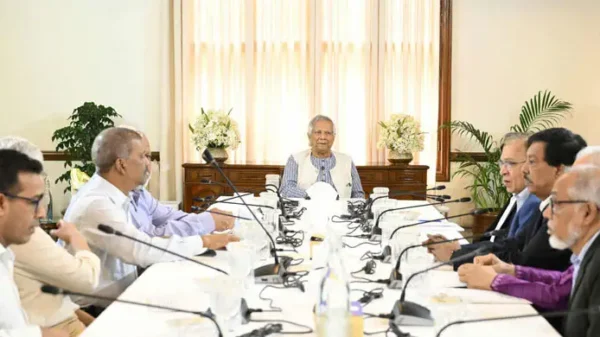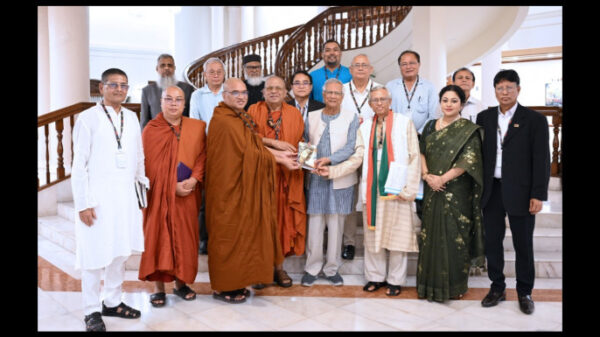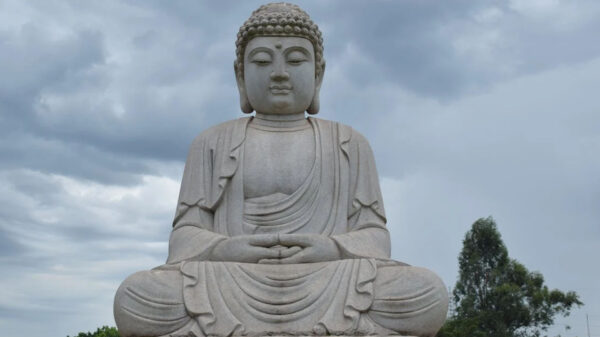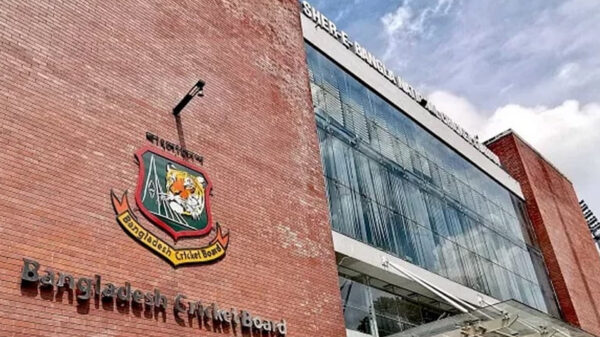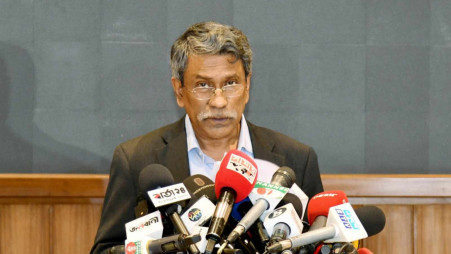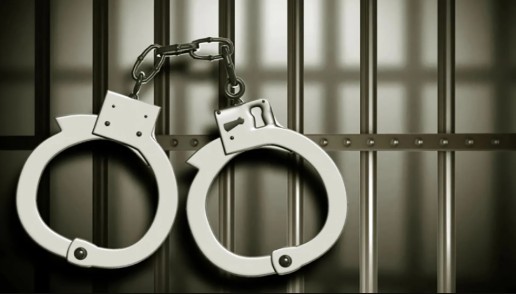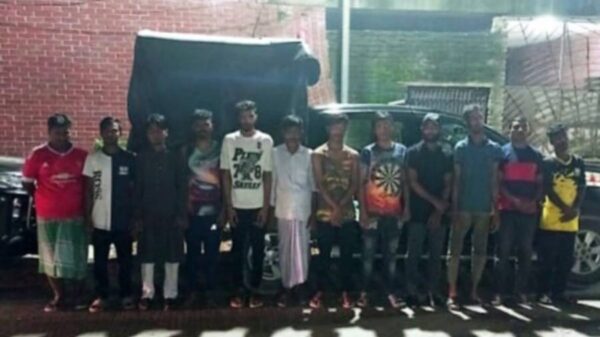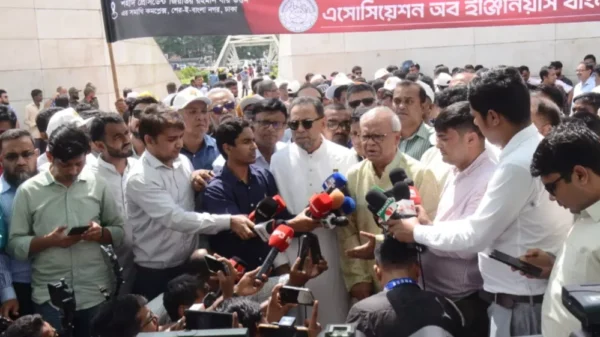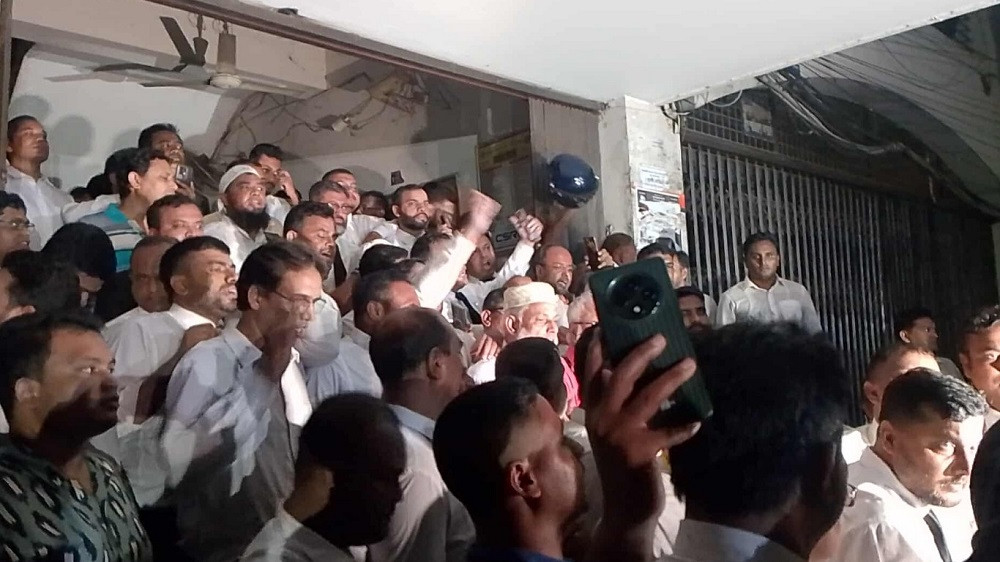Staff Reporter:
ABM Khairul Haque, former chief justice and ex-chairman of the Law Commission – widely regarded as the legal architect of the country’s recent slide into authoritarianism – was arrested early Thursday morning from his residence in Dhaka’s Dhanmondi by a team from the Detective Branch (DB) of police.
His arrest comes amid a cascade of legal complaints accusing him of judicial manipulation, sedition, corruption, and even involvement in a murder tied to the 2024 mass uprising.
Khairul – who annulled the 13th Amendment in a landmark verdict that effectively dismantled the non-partisan caretaker government system and paved the way for a decade of electoral autocracy under the Awami League – was brought to the DB office on Minto Road and later produced before the court of Additional Chief Metropolitan Magistrate Md Sanaullah.
The court ordered him to be sent to jail in connection with a murder case filed at Jatrabari Police Station.
His dramatic arrest triggered a political and legal storm.
Major political parties and sections of the legal community hailed it as a long-overdue reckoning. BNP and Jamaat-e-Islami, who had long held Khairul responsible for undermining electoral democracy, welcomed the move.
“Khairul betrayed the people and the Constitution. His arrest must lead to exemplary punishment,” said BNP Secretary General Mirza Fakhrul Islam Alamgir.
Senior lawyers, too, saw it as a watershed moment.
“This is a warning to the judiciary,” said Assistant Attorney General Muzahedul Islam Shahin, who filed one of the corruption cases against Khairul.
Speaking to the Daily Sun, Assistant Attorney General Shahin said, “If a judge delivers a verdict for political purposes and deviates from justice, one day he must face the consequences – Khairul’s case proves that. A judge’s seat represents justice, honesty and impartiality. If misused to serve those in power, history will not be kind.”
At least six cases filed – From sedition to land fraud
Khairul is currently facing at least six separate cases – four in Dhaka and one in Narayanganj. He was shown arrested in one of the cases that accuse him of playing a pivotal role in dismantling democratic structures, tampering with judicial verdicts, committing corruption, irregularities in land allotment, and involvement in a murder case.
He has long faced criticism for his controversial verdict that abolished the caretaker government system, a ruling that many argue enabled Prime Minister Sheikh Hasina to consolidate unchecked political power.
On 18 August 2024, Supreme Court lawyer Advocate Muzahedul Islam Shahin filed a case with Shahbagh Police Station alleging corruption and judicial forgery in verdicts.
Also on the day, Dhaka lawyer Md Imrul Hasan filed a separate case with the court of Dhaka Metropolitan Magistrate Dilruba Afroze Tithi, accusing Khairul of manipulating and falsifying the judgment that annulled the 13th Amendment, which had enshrined the caretaker government system.
In his complaint, Imrul stated there was a significant discrepancy between Khairul’s initial short order and the full judgment published later. He added that even the short order went against the interests of the state.
On 25 August 2024, BNP leader and former president of the Narayanganj District Bar Association, Abdul Bari Bhuiyan, filed another case with Fatulla Police Station, accusing Khairul of forging and altering the verdict to nullify the 13th Amendment—actions which he said amounted to sedition.
According to this case, Khairul had publicly stated in court that the next two national elections could be held under a caretaker government. However, in the written verdict – issued over a year after his retirement – he omitted that statement under alleged pressure from ruling party figures. The case alleges this omission was deliberate and amounted to deceit, forgery, and an attack on the state system.
The complaint claims that Khairul’s actions constituted criminal offences including breach of trust, forgery, sedition, and subversion of state order.
A separate case was filed in the court of Dhaka Metropolitan Magistrate Mehedi Hasan, accusing five people, including former Prime Minister Sheikh Hasina and Khairul Haque, of involvement in the killing of Firoz Talukder during the 2024 mass uprising. Talukder’s wife, Reshma Sultana, filed the case on 21 August 2024.
Her complaint stated that Khairul, as Chief Justice, ignored the recommendations of legal experts and scrapped the caretaker government system under political instruction. This, she argued, paved the way for autocratic rule and allowed the misuse of state power.
The complaint also alleged that in 2014 and 2018, Hasina and her associates rigged elections, suppressed public dissent, and perpetrated human rights abuses including enforced disappearances and extrajudicial killings.
Khairul was sent to jail in another murder case filed with Jatrabari police station, relating to the death of a youth during the 2024 uprising.
Political reaction to the arrest
Both BNP and Jamaat-e-Islami welcomed Khairul’s arrest. They expressed gratitude to the authorities for detaining the controversial figure, whom they hold responsible for eroding democratic norms.
BNP Secretary General Mirza Fakhrul Islam Alamgir said Khairul “betrayed both the people and the state” through his verdict, sparking long-lasting political instability. Speaking from in front of the BNP Chairperson’s Gulshan office, Fakhrul demanded exemplary punishment, stating, “Let this serve as a lesson so that no one dares to misuse judicial power in the future.”
Jamaat Ameer Dr Shafiqur Rahman also condemned Khairul’s legacy, stating in a Facebook post, “No one has done more damage to this country while sitting in such a prestigious position. His verdict handed over the licence for all misdeeds—disappearances, murders, and looting—to political mafias. His arrest is overdue, and now the nation wants to see his fair trial.”
Controversial tenure as chief justice
Khairul Haque served as Bangladesh’s 19th Chief Justice from 1 October 2010 to 17 May 2011. Following retirement, he was appointed Chairman of the Law Commission in July 2013 and was reappointed multiple times until his resignation on 13 August 2024, just a week after the fall of the Hasina-led government.
Just days before his retirement in 2011, Khairul led the Appellate Division bench that annulled the 13th Amendment. During hearings, eight senior lawyers were appointed as amicus curiae. All but one recommended retaining the caretaker government system.
The verdict was delivered against the overwhelming legal consensus of respected jurists such as Dr Kamal Hossain, Barrister Rafique-ul Huq, Barrister M Amir-ul Islam, and former Attorney General Mahmudul Islam. The ruling provided Prime Minister Hasina with the legal foundation to extend her grip on power.
According to Advocate Muzahedul Islam Shahin, Khairul’s decision constituted a criminal offence under Section 219 of the Penal Code, which punishes judges for delivering corrupt or malicious judgments with up to seven years’ imprisonment.
Legal community demands accountability
Barrister Kayser Kamal, BNP’s law affairs secretary, described Khairul as the “main architect behind the judiciary’s subversion” and demanded a punishment that would serve as a deterrent.
Speaking to journalists, Kamal said Khairul was appointed chief justice by bypassing senior justices Abdul Matin and Shah Abu Nayeem Mominur Rahman, a move widely seen as politically motivated.
Advocate Zainul Abedin, president of the Nationalist Lawyers Forum, alleged that Khairul was complicit in enforced disappearances and political killings.
“Without his punishment, another Khairul will emerge,” he said. He further claimed Khairul evicted Khaleda Zia from her cantonment home and “set a dangerous precedent of judicial dishonesty.”
Zainul Abedin demanded that Khairul be tried publicly and described his appointment to the Law Commission as a reward for the caretaker verdict.
At a separate press conference, Supreme Court Bar Association President Barrister AM Mahbub Uddin Khokon stated that Khairul enjoyed undue privileges from the Awami League government and that many of his decisions undermined democracy, the judiciary’s independence, and the state’s constitutional structure.



